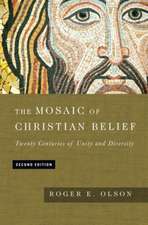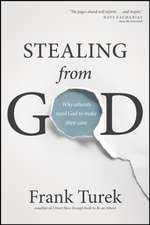Angels: Who They Are and How They Help...What the Bible Reveals
Autor David Jeremiahen Limba Engleză Paperback – 30 noi 2009
People have long been fascinated by stories of angel sightings, yet many contemporary beliefs about angels are based on misconception and myth rather than solide, biblical truth.
As he's done so brilliantly for decades, respected Bible teacher Dr. David Jeremiah uses Scripture to unveil the remarkable truth about these agents of heaven and their role in our world and our lives.
What are angels? What is their role in God's plan? Are they present? Do they appear? Do they give us personal insight about our work and our worship?
In this broad and thorough survey of Scripture, Dr. Jeremiah clearly and simply separates fact from fiction as it relates to angels. His enlightening findings are supported with illustrations and insights from prominent teachers, such as Billy Graham, Corrie ten Boom, C. S. Lewis, and more.
Dr. Jeremiah's down-to-earth style guides readers around the hype about angels and directly into the "substance of things unseen!"
| Toate formatele și edițiile | Preț | Express |
|---|---|---|
| Paperback (2) | 89.91 lei 3-5 săpt. | |
| Multnomah Books – 30 noi 2009 | 89.91 lei 3-5 săpt. | |
| Christian Large Print – 30 apr 2010 | 104.93 lei 3-5 săpt. |
Preț: 89.91 lei
Nou
Puncte Express: 135
Preț estimativ în valută:
17.21€ • 17.85$ • 14.38£
17.21€ • 17.85$ • 14.38£
Carte disponibilă
Livrare economică 24 februarie-10 martie
Preluare comenzi: 021 569.72.76
Specificații
ISBN-13: 9781601422699
ISBN-10: 1601422695
Pagini: 237
Dimensiuni: 135 x 203 x 18 mm
Greutate: 0.2 kg
Editura: Multnomah Books
ISBN-10: 1601422695
Pagini: 237
Dimensiuni: 135 x 203 x 18 mm
Greutate: 0.2 kg
Editura: Multnomah Books
Notă biografică
Bible teacher Dr. David Jeremiah is the senior pastor of Shadow Mountain Community Church in San Diego, and founder of Turning Point Radio and TV Ministries. His radio program is carried on more than 2,500 stations worldwide, while the TV broadcast is received by 500 million homes via cable and satellite. The recipient of numerous prestigious awards for broadcast excellence, Dr. Jeremiah's many books have garnered Gold Medallion awards and achieved bestseller status with The Wall Street Journal, USA Today, and The New York Times.
Extras
Chapter One
WHAT IN THEWORLD ARE ANGELS DOING?
IN A DOCTOR’S OFFICE one fall day a decade ago, I was told I had cancer. I’m sure you’ll understand when I say I was fearful. It was one of those times when I would have cherished having an angel with me in the room, assuring me everything would be okay.
In the months that followed I felt the same fear when I prepared to have surgery on two occasions. An angel’s hand holding mine as I was wheeled into the operating room would have been treasured comfort.
But as far as I knew, I’d never seen an angel. Never. Did that mean something was wrong with me? Why did only other people have that privilege? Wasn’t I spiritual enough?
Maybe you’ve asked the same questions. And maybe you’re dissatisfied with the answers you’ve received. The widespread interest in angels has thrown a lot of information your way—but also confusion and contradiction and flimsy speculation. Where can you go for solid, meaningful information? How can you gain a balanced and accurate perspective that’s built on God’s reality and eternal truth?
That’s what this book is all about.
Welcome Wonders, or a Waste of Time?
Ever since the 1990s, angels are everywhere—or rather we find them talked about everywhere, from major magazines and bestselling books and I popular TV shows to kitchen conversations and university seminars. Lots of people say they have actually seen or felt the presence of an angel. Never in history, I suppose, has so much attention been directed at these heavenly beings as in our day.
So what’s the significance of it all? Is the Lord delighted by this burst of curiosity and belief? And does he want you and me to join in the fun—or at least to take a bit more notice of angels than past generations did? Should we be looking around on earth for these heavenly beings? Should we be confident of daily care and protection from angel guardians?
Or is all this a waste of time? Maybe the angel craze that peaked in the 90s was at best just another trivial fad, and at worst a deceptive tactic of Satan’s to divert people’s spiritual attention away from real truth. Like young children at the Grand Canyon who can’t see beyond the spoiled chipmunks darting along the rim seeking tourist handouts, if we start focusing on angels, we might miss the grand, sweeping view of God.
On the other hand, could more attention on angels actually be God’s desire and plan for his people at this moment in history? Is it perhaps a clue and signal that we’re on the threshold of something bigger in God’s timetable for the world? Is the present age about to end? In God’s mercy and love for sinners, has he caused a belief in spiritual angels to be more respectable so people can better accept the spiritual message of the gospel—before it’s too late?
Or as some highly respected Bible teachers say, is there no such thing as angelic activity in our world anymore, since the close of Bible times?
The questions go on and on. (I wonder if the angels are asking them too.)
Probably no major theological issue has received as much secular attention in modern times as the doctrine of angels has in our day. You would expect Christians to be delighted at this, and start rushing in to make the most of this fresh opportunity for spiritual dialogue with the non-Christian world. But a good many Christians don’t know what (if anything) to think about angels.
At least when the “God is dead” notion grabbed headlines a few decades ago, Christians were united in their response: No, they proclaimed, God is alive! But when headlines along the grocery checkout lane talk about widespread angel activity and belief in personal angels, the typical Christian reaction is: Well, maybe—or maybe not.
The Dangers
The angel craze seemed to trigger a major shift in thinking for our culture. What had once been mostly a myth to previouis generations became a fascinating reality in the popular mind. For example, more than a million people worldwide read the bimonthly Guideposts magazine Angels on Earth, in which each issue features a handfull of stories about people who believe they’ve encountered angels.
This all seems to fit into a greater openness to spirituality that’s been building for years. Few people think anymore that all of life’s important answers can be found in science and rational thought and reasonable logic. They know reality has another dimension—a spiritual dimension beyond science and reason. And this “other” side of reality keeps growing bigger in popular thought.
What does all this mean? Is it good or bad?
The biggest danger may well be greater susceptibility to spirituality’s dark side. Mankind’s mental doorway may be open wider to thinking about religion and eternity, but it’s probably also open wider to Satan’s influence.
Scripture warns us that “Satan himself masquerades as an angel of light” (2 Corinthians 11:14). Perhaps this strategy of deception wasn’t so effective in the generations just before us. People weren’t as open to believing in angels then, and if you talked about seeing one or wanting to, you might have been called flighty or foolish or weird.
Now the situation has changed. It’s acceptable and even fashionable to believe in angels, and millions around the world are looking for angelic activity as never before.
But a stronger belief in angels is no guarantee of greater understanding of God’s truth. The devil can ensnare us as much through “angelism” as he can through materialism or sexual lust or power-hunger. In fact he has scored some of his greatest triumphs in the disguise of angels. In the year 610 the oppressive religion of Islam was born when Muhammed received the contents of the Koran in a series of visions from someone he believed to be the angel Gabriel. Twelve centuries later, the deceptive cult of Mormonism
supposedly arose when an angelic being called Moroni got Joseph Smith connected with the Book of Mormon.
Is Satan doing the same thing again? Or instead of launching a big new anti-Christian religion or cult, perhaps he and his demons are simply using angelic disguise—a little here and a little there—to flirt with people’s fascinations and to create a curiosity and craving for angelic presence. By influencing the right people with the right connections to get the right books and magazine articles published and the right TV shows on the air, he can lure millions into a false sense of spiritual experience and security. The syrupy sweet,
spirit-tingling taste of a little angelism can ruin people’s appetite for the good, solid food of God’s Word and his gospel of grace and truth.
Even secular publications recognized at least partly this aspect of angelmania. They noted the easy lure of preferring angels over God and describe how angels offer a form of spirituality devoid of Jesus and God. Because belief in God is no longer “popular” in America, it is possible to believe in anything. People are searching for spirituality–but not if it involves God. Time magazine insightfully stated, “angels are the handy compromise, all fluff and meringue, kind, nonjudgmental. They are available to everyone, like aspirin.”
Life magazine attached the label “God Lite” to the angelism movement. The magazine’s reporter visited a conference of angel enthusiasts. Unlike the mighty heavenly beings described in the Bible, the reporter said the angels described to him at the conference were
a more benign and bite-size species, cuddly as a lap dog, conscientious
as a school crossing guard. I heard angels likened to spiritual
kissing cousins, flower delivery messengers… and just a nice feeling
of warmth and love that washes all over you. Today’s angels seem to
spend a lot less time praising God than serving us. While they are
still making super-hero, nick-of-time rescues, they are also showing
up in less dire emergencies to track down a set of lost keys or make
a chicken casserole more flavorful. Indeed, nearly all the angel
believers I met got around to mentioning their parking space angel
whom they call upon while cruising crowded city streets.
If some of your neighbors or friends or family members become attracted to an empty and frivolous but potentially dangerous angelism, will you be able to steer them out by showing them God’s truth about angels? It’s my prayer that this book will help you do just that. There’s nothing that deals with error like a good dose of truth.
Meanwhile let’s remember God is sovereign. He’s shown in history that he uses even the mistakes and tragedies and follies of mankind to accomplish his higher will. Could it be that in our day he’s using angelmania—even though it’s often excessive and eccentric—to give his people a certain push? Does he want to sharpen our sensitivity toward spiritual realities? After all, it looks as if angels will be a big part of our eternal environment, which will be far more substantial than our short and shadowy presence on this earth. Being eternal themselves, angels have a greater claim to “reality” than our homes and jobs and hobbies. And unlike our homes and jobs and hobbies, the holy angels are always pointing us in the right direction: toward God.
Just thinking about angels can give us a fresh reminder that there’s another world besides this one that clings so closely all around us. Angels already experience the fullness of that other world—God’s eternal, heavenly kingdom—where God’s rule goes entirely unopposed and unquestioned. Someday we’ll experience it with them.
Jesus was turning our eyes toward this other, unseen world when he taught us to pray, “Thy will be done on earth as it is in heaven.” Hearing those words, we easily assume that right now in heaven angels are doing God’s will perfectly and gladly. So we ask the same for us, here and now. And when we sincerely pray “Thy kingdom come” to our heavenly Father, we show him that we long for something better than the enemy territory which our world is today, infested by sin and filled with deceptions from the fallen angel Satan.
The Real Thing
Before preaching and writing on this subject I read hundreds of stories describing angel sightings and encounters. Many are far-fetched and go beyond the bounds of what Scripture allows as being reliable. For example, the Bible gives no indication angels will respond if we pray directly to them for help. In fact in Scripture we don’t find any instances of people even asking God to send them an angel’s protection. And the only person in Scripture who tried persuading someone else to seek help from an angel was Satan, who quoted an Old Testament verse about angelic protection while tempting Jesus in the wilderness (Matthew 4:6).
More importantly, Scripture gives no basis for assuming angels will serve and help non-Christians. The Bible describes angels as “ministering spirits sent to serve those who will inherit salvation” (Hebrews 1:14). Who are these people destined to “inherit salvation”? The Bible makes it clear that this refers only to those who come to know Christ as Savior. It’s to serve only them that angels are sent. If someone claims to have seen an angel yet that person professes no allegiance to Jesus Christ, it’s likely that any angel he saw (if he truly saw one at all) was a fallen one—one of the devil’s messengers, not the Lord’s. Not every angel is from God.
A book far larger than the one in your hands would be needed to discuss all the circulated opinions and beliefs about angels which down through history have either been highly questionable or in flat opposition to biblical truth. But what about angel stories that fit within Bible parameters and which are reported by trustworthy sources, by people we would never expect to make things up? Should we believe them?
In his landmark 1975 book Angels (which has sold more than two and a half million copies and continues as a bestseller), Billy Graham collected and retold many reputable stories of experiences with angels, including this family account of his maternal grandmother’s death:
The room seemed to fill with a heavenly light. She sat up in bed and
almost laughingly said, “I see Jesus. He has his arms outstretched
toward me. I see Ben [her husband who had died some years earlier]
and I see the angels.” Then she slumped over, absent from the body
but present with the Lord.
Billy Graham said he believed in angels not only because of the Bible’s testimony about them, but also “because I have sensed their presence in my life on special occasions.” He wrote:
As an evangelist, I have often felt too far spent to minister from the
pulpit to men and women who have filled stadiums to hear a message
from the Lord. Yet again and again my weakness has vanished,
and my strength has been renewed. I have been filled with God’s
power not only in my soul but physically. On many occasions, God
has become especially real, and has sent his unseen angelic visitors
to touch my body and let me be his messenger for heaven, speaking
as a dying man to dying men.
He also recounted such exciting stories as this one from pioneer missionary John G. Paton in the New Hebrides Islands, in the South Pacific:
Hostile natives surrounded his mission headquarters one night,
intent on burning the Patons out and killing them. John Paton and
his wife prayed all during that terror-filled night that God would
deliver them. When daylight came they were amazed to see that,
unaccountably, the attackers had left. They thanked God for delivering
them.
A year later, the chief of the tribe was converted to Jesus Christ,
and Mr. Paton, remembering what had happened, asked the chief
what had kept him and his men from burning down the house and
killing them. The chief replied in surprise, “Who were all those men
you had with you there?” The missionary answered, “There were no
men there; just my wife and I.” The chief argued that they had seen
many men standing guard—hundreds of big men in shining garments
with drawn swords in their hands. They seemed to circle the
mission station so that the natives were afraid to attack. Only then
did Mr. Paton realize that God had sent his angels to protect them.
The chief agreed that there was no other explanation.
One of the most popular angel stories of this century happened in a
gruesome Nazi prison camp in the Second World War, as told by Corrie ten
Boom in A Prisoner—And Yet. She and her sister Betsie had just arrived at
Ravensbruck, where new prisoners were being searched. Corrie was hiding
a Bible under her dress.
It did bulge out obviously through my dress; but I prayed, “Lord,
cause now Thine angels to surround me; and let them not be transparent
today, for the guards must not see me.” I felt perfectly at ease.
Calmly I passed the guards. Everyone was checked, from the front,
the sides, the back. Not a bulge escaped the eyes of the guard. The
woman just in front of me had hidden a woolen vest under her dress;
it was taken from her. They let me pass, for they did not see me.
Betsie, right behind me, was searched.
But outside awaited another danger. On each side of the door were
women who looked everyone over for a second time. They felt over
the body of each one who passed. I knew they would not see me, for
the angels were still surrounding me. I was not even surprised when
they passed me by; but within me rose the jubilant cry, “O Lord, if
Thou dost so answer prayer, I can face even Ravensbruck unafraid.”
Christianity Today reported a story of angelic intervention told by the editor of Leadership, a magazine for church leaders. One night the editor’s young daughter was in a coma and near death. A hospital staff worker looked into the girl’s room and witnessed an astonishing sight: Angels were hovering over the girl’s bed.
Amazingly, the following morning the daughter had recovered. Her father, a man not prone to sensationalism, did not hesitate to believe angels had truly visited his daughter. Meanwhile the hospital worker renewed her commitment to God as a result of what she had seen in the girl’s room that night.
A Reliable Source
Stories like these are from sources we’ve come to trust. So do people really see angels today? If so, who are these angels, and what in the world are they doing?
We’ll look at these and many other questions in this book. And the Bible will be our guide. Actually there’s nowhere else reliable to look. We would know nothing dependable about angels if it weren’t for the fact that God himself has told us. Apart from divine revelation, science and human wisdom can’t come close to answering our questions on this topic, and would only mumble and stumble along through speculation. The Bible, however, as Lewis Sperry Chafer reminds us,
reflects God’s knowledge of the universe rather than man’s; therefore
in the Scriptures the angels, concerning whom man of himself could
know nothing, are introduced with perfect freedom.
Scripture is our source and standard. Much that goes on in the name of angels in our world isn’t biblical; we need caution not to get caught in the web of angelmania. Whatever our past experiences or beliefs or opinions regarding angels, they must be checked against the principles of Scripture. They must spring from Scripture, not from what we’ve conjured up in our minds that we’d like to believe about angels.
Don’t worry that limiting our authority to God’s Word will make this a dull subject. In that “perfect freedom” of disclosure that Chafer noted, what the Bible says about angels is stirring and eye-opening and heart-opening.
Therefore we can enter gladly and easily into an experience with angels any time we like. God has given us rich and inspired messages in Scripture that usher us right into the essence of what angels are all about. God’s Book is the thrilling place and the trustworthy place to learn about them. We can see them and hear them and watch them work, and find out all that their examples can teach us. Through careful study, anyone who truly seeks the Lord with a good and honest heart can find these riches.
And yet for all that the Scriptures tell us about angels, the serious Bible student soon gets the feeling God has been guarded in what he’s revealed. Everything Scripture says concerning angels is in connection to something else as the main theme. There are no pages or passages whose central purpose is to spell out a doctrine of angels. So we can’t uncover as much about them as we might like. Unfortunately those who don’t understand or appreciate the Bible’s wisdom and authority have been quick to jump in and try to fill all the gaps with fanciful conjecture. We ought to try to know as much about angels as God has determined to reveal to us—and then be content to leave it at that. Someday we’ll understand more. But try crossing that line now and you can end up doing yourself damage.
It’s like our knowledge of heaven. We really don’t know much about it. The bottom line is that heaven is where God is, which is all that should be important. The writer of Psalm 73 shows the right heart when he tells God, “Whom have I in heaven but you? And earth has nothing I desire besides you.” Besides God there is no one on earth and no one in heaven—not even angels—who can give your soul true fulfillment.
So make sure God sets your agenda, whatever knowledge you seek. John Calvin worded it this way as he launched his own discussion of angels:
Let us here remember that on the whole subject of religion one rule
of modesty and soberness is to be observed, and it is this—in
obscure matters not to speak or think, or even long to know, more
than the Word of God has delivered.
So what does the Word of God deliver to us about angels? How much does God really want us to comprehend about this mysterious subject?
Let’s explore the answers together.
Angels and Me and You
But first come back with me to that fall day, when I found out I had cancer. I never did see or hear an angel in the room with me, as much as that might have encouraged me then. But I did feel God’s presence. And who’s to say seeing an angel would have been better than that?
Both times that I went into surgery, I found a peace in my heart that was born out of my relationship with God. Looking back on those months I wonder what an angel could have added to that peace—except perhaps another exclamation point to my belief that God was there, caring for me.
So as I think about why some people see angels and others don’t, I wonder if God doesn’t withhold the sight of angels from most of us so we’ll understand where our trust should truly be and where we really should focus our attention. Maybe we don’t need all the sensations and excitement that so many people clamor for. Wonderful as the presence of an angel might be, God has given us something better. In fact he’s given us the greatest
gift of all: his presence through his Holy Spirit, and in his Word.
Maybe it’s even possible that the lack of an angelic manifestation in my life is like a backhanded compliment. God may be telling me, “Jeremiah, you don’t need an angel. You’ll be fine. You know who you are and Who is with you—and that’s enough for now.”
If an angel has never made himself known to you either, maybe you can take it as God’s affirmation of your trust in him. And if someday in the future God deems it wise and good to dispatch an angel to me or to you, I’m sure he will. I don’t have a fixation on angels, but I’m more convinced than ever that they are far more involved in our world than most of us realize. I believe they certainly do intervene here, both visibly and invisibly.
Meanwhile, whether or not we ever see an angel before we’re carried home to heaven, there’s great value in exploring what God has to say about them. As C. F. Dickason reminds us in his biblical handbook Angels: Elect and Evil,
Though angelology is not a cardinal doctrine, its acceptance opens
the mind to a better understanding of the Bible, God’s plan of the
ages, the Christian life and ministry, as well as world conditions and
the course of world affairs.
If studying this subject has anything close to the impact on you that it already has had on me, your mind and heart will soon be opened to believe a host of things you may never before have realized. There’s a lot more to this “strange” topic of angels than we imagine. Once we honestly investigate the amazing things Scripture tells us about them, we actually find ourselves drawn closer to God, instead of being distracted and turned away from him. Anyone who goes into a study of angels with a high view of God will come away with an even higher view.
That, in fact, is the only sufficient aim in a study of angels: that you might draw closer to God. If you study angels and the result is anything less —if you build up only a file of information about angels or a fascination with them or even a supposed relationship with one, but haven’t encountered at least a tug toward humble submission to the Almighty God…you’ve totally missed what angels are all about.
Recenzii
“Outstanding! As one would expect from David Jeremiah, this book reflects a theologian’s concern, a pastor’s heart, and a Biblicist’s accuracy.”
—Dr. Bruce Wilkinson, New York Times bestselling author
“David has that uncanny ability to be deliberate without being dull. His words will deepen your gratitude for God’s messengers in light of God’s Word.”
—Max Lucado, pastor and bestselling author
“Dr. David Jeremiah shifts the focus from contemporary ‘angel hype’ to the fascinating biblical truth about God’s powerful messengers.”
—Dr. John C. Maxwell, founder of INJOY, Inc.
—Dr. Bruce Wilkinson, New York Times bestselling author
“David has that uncanny ability to be deliberate without being dull. His words will deepen your gratitude for God’s messengers in light of God’s Word.”
—Max Lucado, pastor and bestselling author
“Dr. David Jeremiah shifts the focus from contemporary ‘angel hype’ to the fascinating biblical truth about God’s powerful messengers.”
—Dr. John C. Maxwell, founder of INJOY, Inc.






















